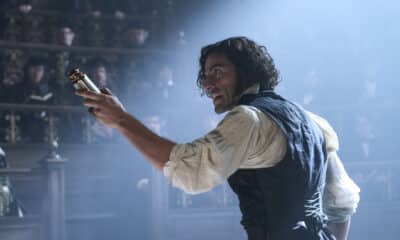
The Barbican Centre in central London is the setting for our discussion with accomplished nature documentary filmmakers and producers, Alastair Fothergill and Mark Linfield, as well as the master of the animal kingdom himself, Sir David Attenborough. Fothergill and Linfield, who are long time colleagues of Sir David, bring the medium to the big screen, in the form of Disneynature’s CHIMPANZEE, which follows a young orphaned chimp named Oscar as he tries to adapt and survive in increasingly difficult circumstances.
How physically demanding was it to go out and film in the Tai National Forest for four years?
ML: Incredibly so. The camera crew in particular bore the brunt of it. They tended to to do three days or so in the field before taking a day off, because the sheer weight of the equipment, let alone the conditions, was so difficult to take. Their legs could barely move. One of the main reasons for this was that you have to start the day when the chimpanzees decide. Our camp was maybe two hours away from where they were nested, so you’ve got to get up at about half three in the morning, leave at four, then you’re with them all day, as they travel maybe fifteen or twenty kilometres through the forest. They finally go to bed at about six o’clock. Only then can you start your two hour journey back to the camp. By the time you get there, you only have a few hours before you’re up again. It’s dark. It’s wet. It’s particularly wet in the wet season, which is when the chimpanzees do the most interesting things, including the hunting of monkeys.
AF: I think for us as directors, one of the main challenges was going out and trying to film a story. Regular nature documentaries don’t need a narrative as such, but we were making a movie too, so we needed a strong story. We never really knew if we had it, even when we went into the cutting room. Our last big shoot was cancelled because of the civil war that was going on in the Ivory Coast. We had planned on going back for three more months. Thankfully, in the end, we had enough footage. We had luck on our side. The adoption of Oscar by Freddy was just an extraordinary thing to happen for us as filmmakers.
Were you tempted to give up at any point because of the hostile conditions?
AF: Our camera man Martin left a diary entry where he said, ‘I don’t feel like this is ever going to end… I’m filming moments, not sequences… I cannot see it coming together, it’s a nightmare.’ That is paraphrasing what he said, but it was quite interesting.
SDA: Also, he is one of the most experienced camera men in the business. If Martin felt like that, everybody would. He’s incredibly tough and dedicated.
AF: Thankfully it was the chimps that kept him and us going. We would have a moment here or get a shot there that would make us realise it was worth it and that it would come together.
Did you have a contingency plan, in case it didn’t work out, or was everything invested in Oscar?
AF: All our money was on Oscar. When Oscar’s mother, Isha, died, the scientist we were working with said Oscar was going to die too. We genuinely thought that was the end. We had spent all our money, and although Disney were not prescriptive, we knew we had to have a relatively happy ending. It was a real worry for us at that time.
Although it would have disrupted the natural order of events, were you tempted to intervene at all, particularly when Oscar was at his lowest?
AF: There was nothing we could do. You could take him to a zoo, but you would have to find a particularly good one for him to have any kind of life, but even then, Oscar would have struggled to fit in with the captive bred chimps. There really is nothing you can do unfortunately.
SDA: If you tried to, you would really be putting yourself in huge danger. You would be risking your own life if you tried to intervene and angering the adult chimpanzees in the process. They can do serious damage when they feel threatened or encroached upon. You would be less than human if you didn’t want to try and get involved and help. When you see a little fawn sitting there, and a leopard is approaching, about to take it, you must feel something in your heart. But, you know jolly well that if you did get up and try to shoo it away, you would be putting yourself in danger, the fawn would still be in danger, and even if you did manage to prevent it temporarily, the leopard would only go and find another target anyway. So, you must concede that the natural order of things is best left untampered with.
ML: This film is a particularly good example of what David is saying. If we had intervened, then Freddy’s adoption of Oscar would not have happened, which worked out far better for Oscar than any life we could have given him.
How did spending so much time with the chimps, only to leave them behind after four years, affect you emotionally?
AF: It affected us greatly. We would all have dinner in the camp of an evening, and all we would talk about were these bloody chimpanzees! We’ve worked with all sorts of animals but it is not the same. Polar bears, for example, do not have nearly the same influence on you.
ML: It’s truly extraordinary. The psychological effects are massive too. For example, because we were living in their habitat, we never saw a horizon and it’s hard to explain what sort of effect that has on you. You can rarely see more than four or five metres in front of you because the forest is so thick. It becomes very oppressive after a while and you start to feel like you are going mad.
AF: Just seeing the sky after months in the dense forest had a strange effect on us. I remember just lying on the ground and staring at them. It’s something you don’t really think about until it happens.
Sir David, seeing as you are a master narrator, what did you think of Tim Allen’s storytelling?
SDA: I thought he was great. I paid very close attention to it in fact, as I have done so much of it myself. He did a lot of the things I know I do, including adjusting his voice for the tone and mood of the particular scene or moment. Actually, what he did much better than anything I think I could do, was that he used humour very effectively, especially when relaying what he thought the chimps were thinking.
Do you enjoy passing the torch onto the likes of Alastair and Mark and seeing their progression over the years?
SDA: I do and I think what they are doing in adapting this medium of nature documentaries and natural history into film is fantastic. It has been tried unsuccessfully before, but I think this has been a great success and truly is a marvelous leap forward.
CHIMPANZEE is out now in the US and UK.
Martin has been a film buff (or geek, if you prefer) for as long as he can remember. However, he lives and longs for storytelling of all kinds, and writes across numerous mediums to feed his insatiable appetite. He lives in north-west London, and his favourite films are, possibly: PAN'S LABYRINTH, THEY LIVE, PSYCHO, HIGH FIDELITY, ONE FLEW OVER THE CUCKOO'S NEST, STAND BY ME, SIDEWAYS and OFFICE SPACE.

1 Comment
Leave a Reply
Leave a Reply
Latest Posts
-


Home Entertainment
/ 8 hours ago‘Piglet’ review: Dir. Andrea M. Catinella (2025)
Before settling in to watch Andrea M. Catinella’s Piglet, it is important to point...
By Kat Hughes -


Film Trailers
/ 8 hours ago‘Black Phone 2’ trailer; horror sequel lines up October release
A new trailer for Black Phone 2 has landed online from Universal Pictures. The...
By Paul Heath -


Netflix
/ 16 hours agoWatch the first six minutes of ‘Wednesday’ season 2
Netflix has dropped the first six minutes of the first episode in season two...
By Paul Heath -


Film News
/ 16 hours agoGuillermo del Toro’s ‘Frankenstein’ is unleashed at Netflix’s TUDUM event
Netflix has gifted the first proper look at Guillermo del Toro’s Frankenstein at a...
By Paul Heath






Dan B
May 3, 2013 at 6:47 am
Sir David, legend!